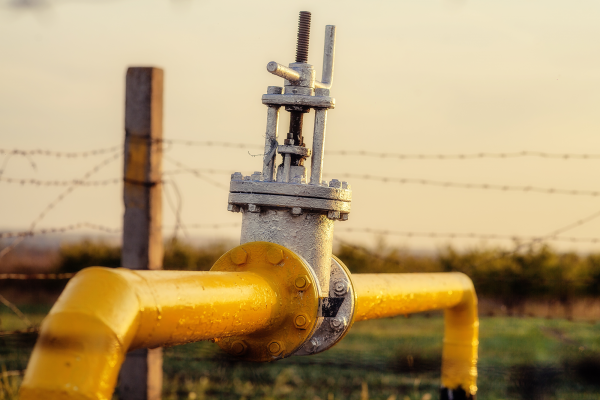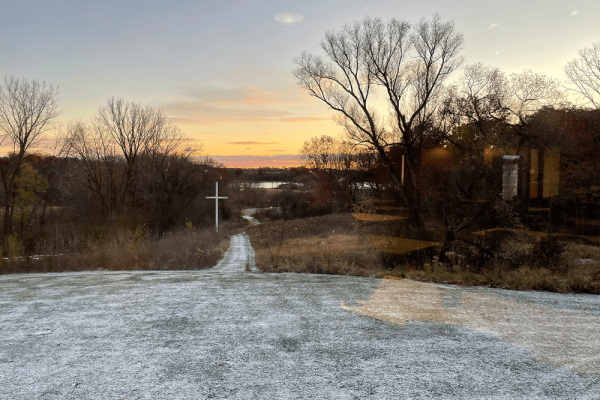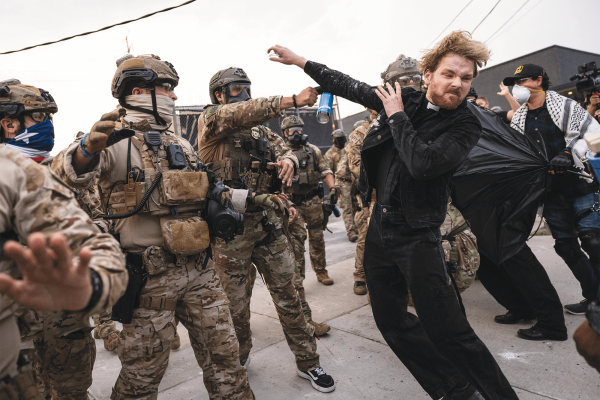THE WORLD HAS known since 2011 that at least 80 percent of all fossil fuels must stay in the ground to keep global temperatures below 2 degrees Celsius. This means that 90 percent of U.S. and Australian coal, and all Canadian tar sands, must stay in the ground. Yet in an August press conference, President Trump reacted to a question on global climate action by defending, at all costs, wealth creation from fossil fuels.
“I’ve made that [fossil fuel] wealth come alive,” Trump said. “We have more of it than anybody else. ... I’m not going to lose it on dreams, on windmills, which frankly aren’t working too well. ... We can’t let that wealth be taken away.”
That wealth, according to author and news anchor Chris Hayes, is valued at $10 trillion to $20 trillion. Hayes notes that $10 trillion in today’s economy is roughly equivalent to the wealth lost by U.S. slave holders as a result of abolition. Comparing the political economies of the slave trade and fossil fuels, Hayes suggests the movement against fossil fuel extraction ought to be called “the new abolitionism.”
Yet, with no global climate plan, the warnings from scientists have become more dire. Many now grapple with depression, while others undergo what’s been called “climate grief.” In 2015, global levels of carbon dioxide surpassed 400 parts per million, a trajectory that takes the world into global heating, ocean acidification, and species collapse. If governments and corporations won’t keep fossil fuel reserves in the ground, it’s clear that others will have to step in. Fortunately, some have.
Shut It Down
ON OCT. 11, 2016, five people orchestrated the largest coordinated shutdown of oil pipelines in U.S. history. With nothing more than bolt cutters, the “valve turners”—Michael Foster, Leonard Higgins, Emily Johnston, Annette Klapstein, and Ken Ward—used emergency shut-off valves to close five pipelines in North Dakota, Minnesota, Montana, and Washington carrying Canadian tar sands crude into the United States.
In an action that “shook the North American energy industry,” according to Reuters, the valve turners disrupted 2.8 million barrels of tar sands heavy crude for almost a day—equal to 15 percent of daily U.S. consumption. Before shutting the lines off, the valve turners notified the engineers responsible for monitoring them. The five waited until local sheriffs took them into custody. The valve turners and their support team were charged with 27 felonies and 15 misdemeanors.
“There’s [a climate] emergency, and we have been late to the scene,” Foster, one of the five, told Sojourners. “As much as we have to stop all these new [fossil fuel] projects, we actually have to shut down some of our existing consumption, our existing production, our existing transportation. If we don’t do that, then we could spend the next 30 years fighting every new project, and win, but we would still all be eliminated.”
For activists like Foster, keeping 80 percent of fossil fuels in the ground makes direct action a necessity. Others have taken similar steps: In 2015, Vanessa Gray shut off a pipeline carrying tar sands oil through her First Nation’s territory in Ontario. In 2017, Ruby Montoya and Jessica Reznicek in Iowa pierced Dakota Access pipeline valves with welding tools.
“Four Necessity”
IN 2019, ANOTHER group of “valve turners” struck.
On Feb. 4, four people in rural Minnesota gained access to the manual shut-off valves for Enbridge’s controversial Lines 3 and 4, which carry tar sands oil from Alberta to Wisconsin. Enbridge Inc., a Canadian company, is responsible for the largest inland oil spill in U.S. history.
The “Four Necessity Valve Turners,” as they call themselves—Brenna Cussen Anglada, Daniel Yildirim, Allyson Polman, and Michele Naar-Obed—are affiliated with the Catholic Worker movement, an international network of Catholic communities founded in the U.S. in 1933 by Dorothy Day and Peter Maurin. Day and Maurin stressed taking personal responsibility for those who suffer, even at personal cost.
In a public letter, the four activists stated their intention to take “responsibility by standing in the way of this deadly fossil fuel industry.” Anything short of direct action, they said, is “lethally inadequate.”
“As Christians, it’s important that we take personal responsibility for one another,” said Polman, a farmer from Texas. Polman joined the Catholic Worker movement after campaigning with Frack Free Denton, helping to pass the first citywide fracking ban in Texas. The victory was short-lived. Months after Denton voters outlawed fracking, the state nullified the will of the people. Polman, disheartened, began to reconsider her options.
For Naar-Obed, the 2016 valve-turner action was not only inspiring but “very doable.”
“I felt like I was being called to actually help bring it into fruition,” explained Naar-Obed, who learned about earlier valve turners while studying Pope Francis’ major religious work on climate and economics, Laudato Sí. She pondered her own obligation to address the climate crisis.
Naar-Obed has experience with extensively researched, carefully planned, and deeply discerned direct action through her participation in the Plowshares movement, a Christian anti-nuclear weapons campaign that advocates nonviolent direct action in defense of life. She said she approached the valve-turner action with a great deal of caution. “I spent a lot of time talking with my spiritual director, trying to discern: Is this a call or is this frustration?” said Naar-Obed. “The preparation, for me, was learning how to hear the Spirit. Really recognizing that this is the Spirit and not my own voice, not my own ego.”
Before meeting Naar-Obed at a retreat in 2018, Polman had struggled with her faith and struggled with the Catholic Church. “I had been praying for older women to mentor me,” Polman said. “Then I heard Michele talk, this humble and grounded woman, who has done multiple Plowshares actions in resistance to nuclear war, and all this work she has done was because of her faith in Jesus, as an activist. My idea of how we see Jesus turned in a whole new way.”
Polman decided to join Naar-Obed in a valve-turner action.
For nine days prior to the February pipeline shutdown in Minnesota, Polman prepared spiritually by offering a rosary novena, an ancient Christian prayer cycle focused on the mystical experiences of Jesus, usually prayed using a string of beads to count the prayers. For six of those days, her companions joined her.
“It makes me cry, because it’s just so beautiful,” said Naar-Obed. “You can’t help but know that the ancestors that we invoked in our prayers, and the saints and angels, were right there with us. We brought those rosary beads with us [to the pipeline substation].”
In the early hours of Feb. 4, with temperatures in the single digits, Anglada, Yildirim, Polman, and Naar-Obed arrived at the block valve site of Enbridge’s Lines 3 and 4. They cut the gate lock, then called the posted emergency number to alert Enbridge of their intention to shut down the lines. Despite the team’s extensive research and preparation, the tools they brought to manually shut off the pipes didn’t work. They attempted to remove the valve-control cap with a pipe wrench, a stick, then a wooden crucifix. Nothing worked.
After two hours, they heard a whirring noise—and watched Line 4 slowly shift to the off position. “We were about to give up on how to get that cap off. And then [the line] went down. The timing was just incredible. We broke into song at that point,” said Naar-Obed.
Later they noticed that Line 3 was also off. Enbridge had shut the lines remotely.
Within half an hour, the Four Necessity Valve Turners were arrested. They were held for two days in the county jail, pled “not guilty” to felony trespass and misdemeanor property damage, and were released without bond.
Lines 3 and 4 are two of five Enbridge-operated pipelines that together carry more than 2.5 million barrels of tar sands crude oil per day across northern Minnesota. They were down for at least four hours. “Doing the valve turning was a spiritual act: an act of grief, and an act of celebration—grief for the violence done to the earth and other vulnerable lives, and also a celebration for life,” said Polman.
An Antidote to Despair
ALTHOUGH THE 2016 valve turners identified their motivation as strategic rather than religious, the message of the Catholic Workers is not foreign to them. Like the Catholic Workers, each wrestled with how to keep faith in an era of upheaval and climate collapse.
“Christianity and climate action should be synonymous,” said Foster, one of those engaged in the 2016 action and a former family counselor who was raised Southern Baptist. “When you immerse yourself in the climate science, and you understand the politics and the economics that are driving this suicidal planet-killing experiment forward, it’s very similar to being born again, into a world where you can pull back the veil and see ... an actual physical reality, and it’s dying. It’s difficult to describe to people who haven’t experienced that. So, being ‘in the world and not of it,’ as a Christian, and being ‘in the world and not of it,’ as a climate activist, are very similar things.”
To be fully in the world of climate chaos means to deal with a despair that threatens to crush. For most of the valve turners, direct action was an antidote to this—an alternative to feeling defeated by the latest hurricane, the biggest wildfire, or the latest climate science announcing that things are much worse than we previously thought. Ken Ward’s struggle with despair is detailed in The Reluctant Radical, a documentary film about the 2016 pipeline shutdown. The most important factor to overcoming climate despair, Ward told Sojourners, is how the people in your life respond—whether they support you or decide you’re crazy.
“Those of us who’ve been doing this for a while, we just assume that people will regularly be incapacitated. Someone will say, ‘I just read a bunch of stuff, and I just can’t deal.’ You have to tend to them; you have to worry about them. It’s going to keep getting worse, because the situation is getting worse,” Ward said.
Ward, who studied in Boston at Andover Newton Theological School, told Sojourners he re-reads the story of Jesus clearing the money changers out of the temple (John 2:13-16) before every climate action “just because it’s fun.” He also returns to Genesis 6-9 and the story of Noah, the great flood, and its resolution in the “rainbow compact.” Ward views this story as the foundation for a renewed ecological ethic in the era of climate breakdown—one that explains the current onslaught of disasters through a biblical lens. The rainbow compact, he explained, created mutual obligations between God, humans, and all other living beings on Earth.
“Here we are killing off the other members of the compact. So that frees up God to flood us again. God does say next time it won’t be a flood, it will be a fire. Apparently, we’re going to get both,” Ward said. He spent two days in jail for his role in the 2016 pipeline shutdown.
Faith in the Mystery
WHEN VALVE TURNERS acted in 2016, they sent a letter to President Obama asking him to declare an emergency and keep the valves off forever. But several valve turners from that group, as well as the Minnesota group, insist that they turned off these pipelines without expectations.
Higgins, another member of the 2016 group, called it “faith in the mystery”— saying that one can never know the outcomes of one’s actions. At the same time, Higgins does not necessarily believe humanity will survive climate collapse. “I don’t have faith that God, or the innate goodness, or the arch of justice is going to turn things in the way they need to go. I think it’s just as possible that it won’t,” he said.
“We’re awaiting a trial that could have greater implications, but for us we decided this is a faith-based action, and whether or not it would change things practically, we are doing it,” Polman told Sojourners.
Not every valve turner agrees. “I’m so impatient,” said Foster. “It’s hard for me to trust the ripples that connect what I did in 2016 with the Minnesota valve turners and to Extinction Rebellion now. When I shut off that Keystone pipeline, I needed a thousand people to go and do the same thing a week later. The planet needed a thousand people to go out and do the same thing. The planet cannot wait. It just can’t happen fast enough.”
However, Foster also said that turning off the Keystone pipeline was “a rare and wonderful moment, when I was certain that I was standing on the right side of history. Whatever history is left—50 or 500 or 5,000 years—I’m on the right side of that.”
Returning to his beliefs about Christianity and climate action, Foster reflected, “Jesus says, ‘You shall know the truth, and the truth shall set you free.’ As horrible of a shock and burden as it is to understand our dilemma, we can’t live here in a Christlike way and not be willing to sacrifice our lives. If Jesus were here today, he would probably be shutting off a pipeline.” Foster spent six months in prison for his participation in the 2016 valve-turner action.
Higgins offers a counterpoint. “It’s really not a sacrifice,” said Higgins. “It’s a chance to survive and come through in a much better place than we started. The worst circumstance for me is fully understanding the climate emergency, fully understanding the impact on my kids and grandkids and community, and not seeing anything significant I can do to prevent it. To be involved in something on a scale that seemed to have a good chance of having some kind of impact—it was pure bliss.” Higgins was given a three-year deferred sentence, along with a $4,280 bill for restitution and court fees for his 2016 valve-turner action. (Charges against Johnston and Klapstein were dropped.)
Blowback
IN 2017, THE corporate-funded American Legislative Exchange Council developed legislation that would increase the penalties against anyone convicted of disrupting pipeline operations. Last year, the Trump administration introduced legislation that would expand definitions of pipeline damage, which carry up to a 20-year sentence, to include vandalism. Seven states have increased penalties for anyone protesting pipelines.
Conversely, in October, California banned state agencies from providing licenses to build oil and gas infrastructure—such as pipelines—on state lands. Other states are likely to follow.
The trial of the Four Necessity Valve Turners begins in June.

Got something to say about what you're reading? We value your feedback!






